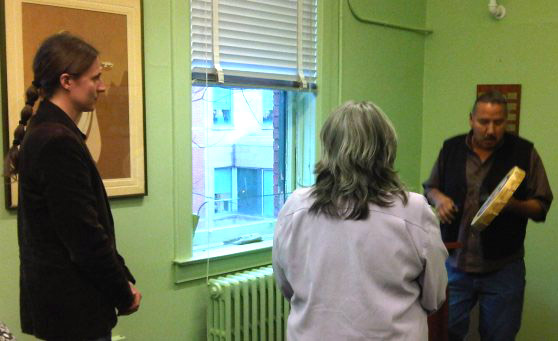No one who knows Aaron Mills was surprised to hear the law student was selected to receive the 2009 University of Toronto’s President’s Award for Outstanding Native Student of the Year.
“Aaron has been an extremely active member of the law school community,” said Alexis Archbold, assistant dean (students). “In particular, his efforts have made a very meaningful impact on the Indigenous Law Journal and Aboriginal Law Students Association.”
“Aaron Mills is one of our superstars,” said Jonathan Hamilton-Diabo, director of U of T’s First Nations House. “This is one of my favourite times of year, where we celebrate the accomplishments of a member of our community.”
Native drumming and singing opened the recognition event at First Nations House on Nov. 19, and several speakers, including U of T President David Naylor, spoke of Mills’ remarkable achievements.

“We have lots of superb students each year,” explained Hamilton-Diabo, “but there are people who stand out, not just academically, but individually in their community. These are people who rise up for us because we know they’re special.”
Hamilton-Diabo praised Mills volunteer efforts and involvement at First Nations House despite his third-year JD course load. “It was phenomenal to see that,” he said.
Mills thanked a long list of supporters in his life—family, friends, colleagues, law faculty and staff. He also read four short, poignant stories he wrote: on his 86-year-old grandmother—who travelled eight hours alone by train from Englehart, Ont., for the event, his aboriginal father, his mother, and his close friend and adviser, Willy.
His uncle Ralph Garlock, of North York, Ont., proudly called Mills “an amazing young man—very modest and humble, with a great big heart. Today, he’s launched himself on a life-long project, which will take him to many successes—for First Nations people, as well as for himself.”
It was a feeling shared by Lee Maracle, traditional teacher, First Nations House, who said previous award-winners have “all gone on to achieve wonderful things.”
The award includes a $4,000 scholarship and a plaque presented by President Naylor, who spoke of the “serious crisis in aboriginal access to higher education, which is part of a greater problem of social justice for First Nations.” Naylor encouraged Mills “to help us to continue to make progress in aboriginal issues.”
Mills paid tribute to his many supporters: “ I realize how small I am, and how many people it took to get me here today.”

